8 Best Ecommerce Platforms to Launch an Online Shop in 2024: Your Gateway to Digital Success
Imagine creating an online shop that not only looks amazing but also works like a charm! In the digital age of 2024, this is not just a dream; it’s a reality waiting for you. Whether you’re a budding entrepreneur, a student with a brilliant idea, or someone looking to turn a hobby into a ecommerce business, the Best ecommerce platforms can set you on a path to success.
Best Ecommerce Platforms play a crucial role in the online retail industry, providing businesses with the tools and infrastructure needed to conduct electronic transactions over the internet. The importance of e-commerce platforms can be understood from various perspectives:
We’ve traveled through the galaxy of e-commerce platforms and handpicked the top 8 that are perfect for launching your online shop in 2024. These platforms are user-friendly, super cool, and ideal for everyone, including our young and students. So, buckle up and join us on this exciting journey to discover which e-commerce platform is your ticket to the stars of online business success!”.
Top 8 Best Ecommerce Platforms
- Shopify
- Shopware
- WooCommerce
- Wix
- BigCommerce
- MAGENTO (ADOBE E-COMMERCE)
- Squarespace
- Appy pie AI Website builder
01. SHOPIFY
Shopify is the “biggie” and best among eCommerce platforms. It is the most popular and used in the English-speaking world and caters to businesses of all sizes. It was founded in 2004. Over 1 million merchants use Spotify’s platform across nearly 1.5 million websites. Shopify has an estimate of 31% market share for eCommerce websites in the United States.
Shopify allows businesses that would not otherwise have the resources to quickly and easily deploy an e-commerce back-end. It has an in-built CMS, multiple themes for your site (with a third-party marketplace for more), and blogging functionality for your online store.
The platform provides a variety of tools and features to simplify the process of building, managing, and scaling an e-commerce business.
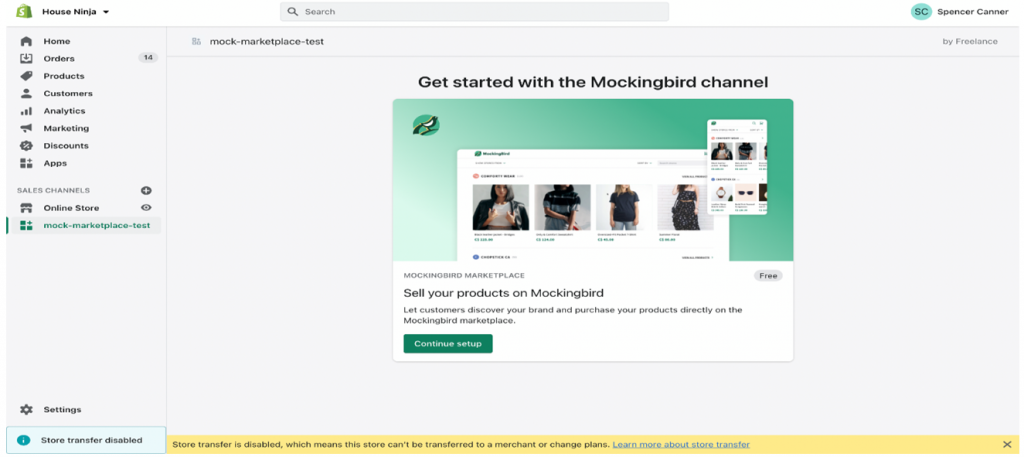
Pros:
- User-Friendly Interface: Shopify has an easy-to-use interface ideal for newbies.
- Extensive App Marketplace: The store offers numerous apps that can be customized to improve their functionality.
- Security Features: The security of shops is a great priority for Shopify, which issues SSL certificates and complies with requirements.
Cons:
- Customization Limitations: On one hand, it is customizable to the highest level possible. However, certain advanced customizations require some coding skills.
02. SHOPWAR
Shopware is one of the best leading open ecommerce platform for all your business and consumer needs—in one comprehensive solution. Whether your business is B2C or B2B, physical goods or digital products, you can customize and automate operations intuitively without writing a single line of code. Shopware has fused performance, agility, and top-of-the-line security into its e-commerce software, giving you complete access to the source code. Hence, you have 100% visibility into your data.
Shopware offers solutions for multi-channel and omnichannel e-commerce businesses, including great training resources, live streams, webinars, online training courses, and a FAQ forum.
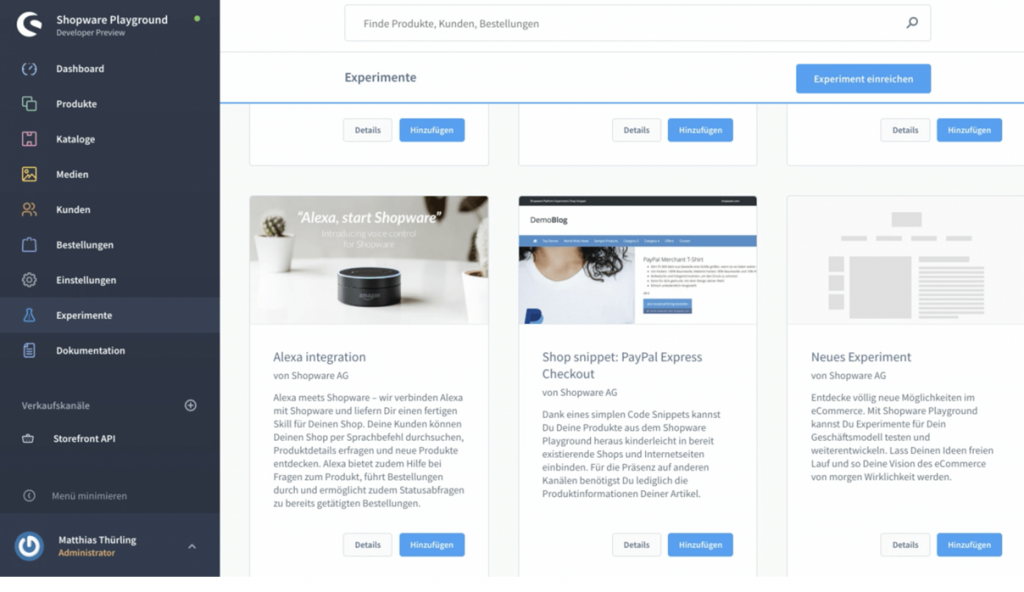
Pros
- Intuitive User Interface: With its simple admin panel, shopkeepers will be actively involved in daily business operations through a single-entry point.
- Flexible Customization: Hence, Shopware enables companies to make their digital presence in line with their corporate identity, USP, USPs, and corporate strategy in general.
- Powerful Marketing Tools: The company has search engine optimization, advertisements, and content marketing aspects that translate to higher returns by increasing visibility on the net.
- Scalability and Performance: Business development will see an increment in Shopeware software, creating a new customer and merchant.
Cons
- Cost of Ownership: Shopware, for instance, is a free-open-source e-commerce solution that helps develop highly flexible custom designs. It may also be more expensive to install than most other similar products.
- Learning Curve: Secondly, this multimedia platform is very difficult to install, so an inexperienced person begins with a “learning curve.”
03. WOOCOMMERCE
WooCommerce is a popular e-commerce plugin for WordPress, one of the most widely used content management systems (CMS) for building websites. Developed by Automattic, the company behind WordPress, WooCommerce enables website owners to turn their WordPress sites into fully functional online stores.
However, using WordPress necessitates the purchase of hosting, a domain name, and an SSL certificate, all of which are catered to by many standalone eCommerce platforms.
To construct an effective WooCommerce site, numerous extensions are necessary. These encompass various payment gateways like Stripe, PayPal, Square, Amazon Pay, and Authorize.Net, in addition to plugins for shipping and email tracking.
WooCommerce supports an infinite number of products and product variants, including digital products.
Woo Commerce Pricing: Its free WordPress Plugin

Pros:
- Integration with WordPress: Smoothly works with widely used WordPress system.
- Cost-Effective: The fact that WooCommerce is an open source and free software makes it economical for a number of these small companies.
- Customization Options: Several themes and plugins exist for personalized looks.
- SEO-Friendly: It was constructed upon WordPress and, therefore, has an advantage in search engine optimization, aiding internet recognition.
- Community Support: As an open-source application, it enjoys a massive support base for troubleshooting and support purposes.
Cons:
- WordPress dependency: To use WooCommerce, users must have a WordPress site.
- Complexity for Beginners: Beginners may find the setup and configuration slightly complex.
04. WIX
Wix is a website builder with drag-and-drop functionality and customizable templates, web hosting, and domain name registration. You can build a basic website for free, but you’ll need to upgrade to a paid plan to use the e-commerce features.
For e-commerce merchants, Wix will accept online payments, track orders, and help you manage orders from multiple channels.
However, Wix lacks features that many product-based businesses need. For example, there are no built-in low-stock alerts, and other key inventory management features are missing. To get those features and the ability to sell through social media, you’ll need to use third-party apps.
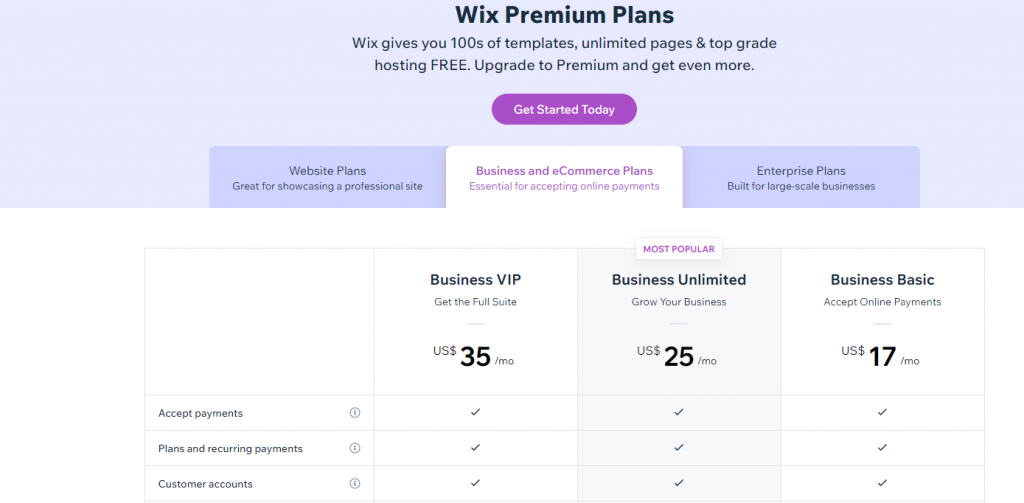
Pros:
- Intuitive Interface: Wiz offers a user-friendly interface for easy navigation.
- Robust Customization: Users can tailor their online store with extensive customization options.
- Advanced Analytics: Benefit from in-depth analytics to track and optimize business performance.
- Mobile optimization: Ensures a smooth shopping experience on mobile devices.
Cons:
- Learning Curve: When first accessing the platform, beginners may encounter a learning curve.
- Third-Party Integrations Are Limited: Some users may find the selection of third-party integrations to be more limited than on other platforms.
05. BIGCOMMERCE
BigCommerce is one of the best eCommerce platforms that provides a SaaS solution that combines the best of SaaS and API to provide you with the enterprise integrations and tools you need to customize your website faster. They are provides a powerful dashboard that allows you to make any necessary changes, as well as extensive user documentation that is simple to understand and up to date. This ecommerce Platform also provides excellent customer service.
Multi-channel selling, SSL certificates, and inventory tracking are all standard features for any e-commerce business.
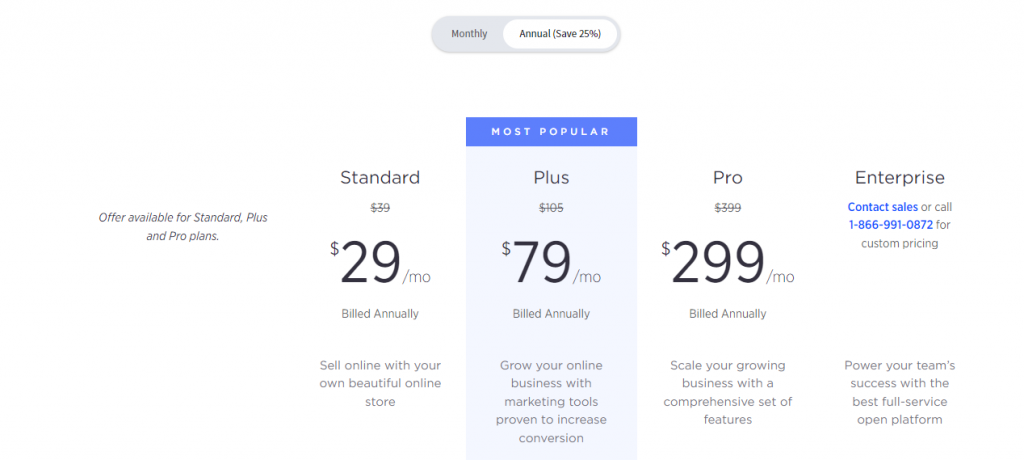
Pros:
- Scalability: Suitable for companies ranging from start-ups to large business organizations.
- Built-In Features: Comprehensive built-in tools and features for seamless online store management.
- Multichannel Selling: You can sell across multiple channels, such as social media and marketplaces.
Cons:
- Learning Curve: Beginners may experience a learning curve due to the platform’s robust features.
- Limited Native Integrations: Some users seek more built-in third-party app options while integrations are available.
06. MAGENTO (ADOBE E-COMMERCE)
Magento (as an open-source and one of the best ecommerce platforms) has made a name for itself in the industry. Afterwards, every business will be catered for individually with customized online stores which suit their unique requirements and branding. As an example, small companies and large corporations can benefit from the Magento scalable solutions.
One of the most flexible design, enables constant renewal for various purposes and shapes by applying it with any changes at all times. This includes a range of add ons, plug ins, and programs tailored to enhance the performance of a shopping cart platform. Everything on improving your e-consumer’s experience, you will find in Magneto. From a complex product safety to a common payment processing system.
best WordPress caching plugins
Firstly, this mentioned shopping cart system also contains an added advantage as it is scalable. However, Magento will be able to integrate other needs as your organization becomes large and advanced. Scalability needed to make new products catalog for commodities, consumers, and commerce (trade).
It’s worth mentioning that another crucial issue that must be taken into account regarding dealings with the virtual world concerns transaction safety measures. Such would be safe for the generality of people and consumers if monitored continuously, through an intelligent society. In addition to this, when it operates in a virtual space, it solves two primary challenges, namely security and speed of operations. Moreover, in such a case, the society can always provide updates that will reflect its operation.
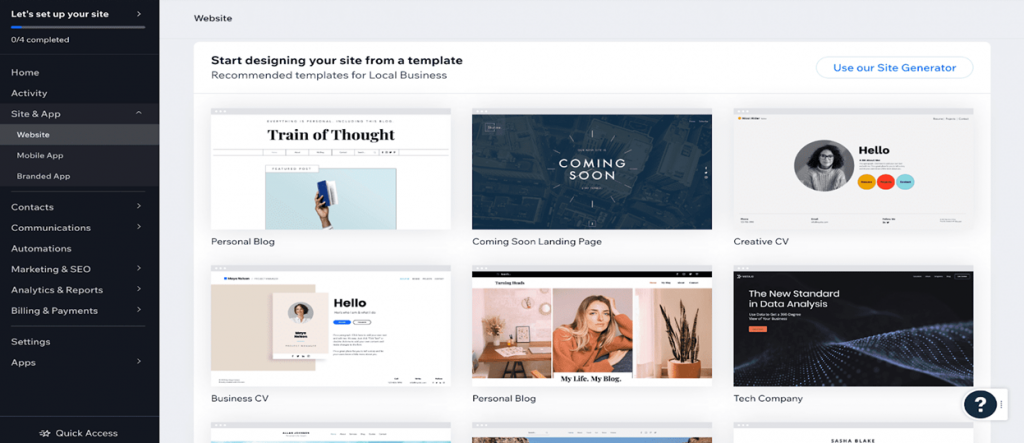
Pros:
- Scalability: Ideal for large enterprises with room for expansion.
- Feature-Rich: Offers extensive features suitable for complex e-commerce needs.
- Customization: Highly customizable, allowing for unique and tailored online stores.
- Community and Enterprise Versions: Serves both community users (free) and enterprise users with additional features.
- SEO-Friendly: Search Engine Optimized for better searches.
- Mobile Responsiveness: Ensures a seamless experience across various devices.
Cons:
- Hosting not included
- Requires technical knowledge
07. SQUARESPACE
Another well-known eCommerce platform is Squarespace. They’ve most likely sponsored at least one of your favorite YouTubers. Since their inception in 2003, they have assisted millions of aspiring entrepreneurs in launching their websites. In terms of e-commerce, it can be used to sell products, services, or subscriptions, making it one of the most versatile e-commerce platforms. Overall, it’s a great product for smaller online stores that value beautiful design.
Squarespace is an excellent choice for beginners, and the setup process is simple. When it comes to creating your website, usability will not be an issue. However, you may find the grid system to be too constrained.

Pros:
- All-in-One Solution: Squarespace integrates website building, hosting, and e-commerce features seamlessly.
- Stunning Design Templates: Access professionally designed templates for visually appealing online stores.
- Built-In SEO Features: Squarespace has strong SEO elements that can boost your online store’s visibility in search engines.
Cons:
- Transaction Fees: Squarespace charges transaction fees on sales made through their platform.
- Third-Party App Integration Is Limited: While Squarespace provides critical functions, it may benefit from a more robust third-party app ecosystem, as seen in other platforms.
08. APPY PIE AI WEBSITE BUILDER
Appy Pie’s AI Website Builder is a revolutionary tool that leverages artificial intelligence to help users create dynamic and versatile websites without the need for coding or technical expertise. this is one of the best ecommerce platforms designed for businesses aiming to establish a robust online presence without the hassle of hiring developers or setting up IT departments. The platform offers a user-friendly interface, allowing users to describe their website concept in plain text, which the AI then converts into a fully functional online application. Appy Pie’s AI Website Builder allows users to create a basic website for free. However, for advanced features and functionalities, there are different pricing plans.
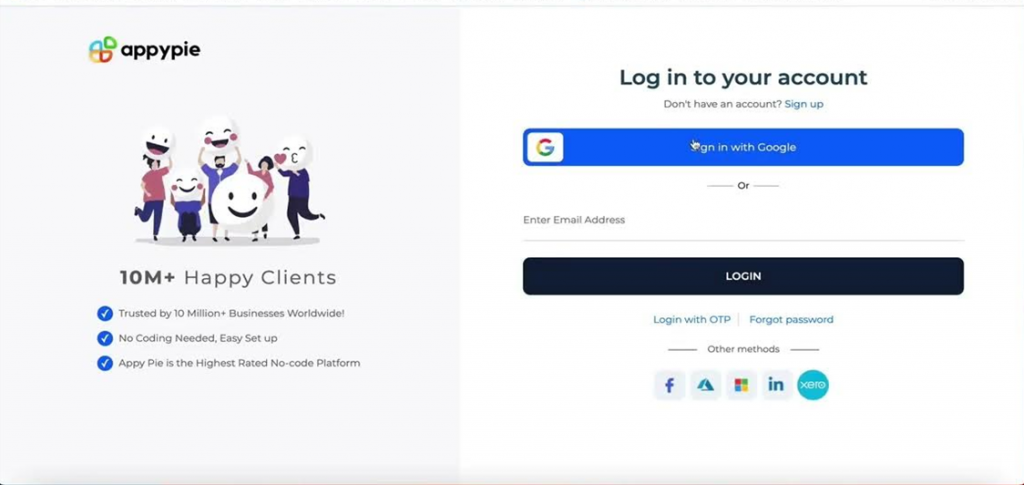
Pros
- AI-Powered Customization: Artificial intelligence is used in the company’s virtual shop for customized options. Thus, such customers will always place an order for the companies to modify the look of their online shop according to them.
- Quick Deployment: The one-day setup of an online store by Appy Pie helps businesses to establish their e-stores. This provides an opportunity for several firms to position themselves strategically in these markets beforehand and seize this chance.
- Integrated Marketing Tools: It also helps many online retail shops that integrate their marketing solutions with Appy Pie. With this technology, many people can access it and also directs some other service or product.
Cons
- Limited Advanced Features: This plan is suitable for small to mid-market businesses but unlikely to be appropriate for advanced internet-based businesses and large-scale corporations.
- Subscription Costs: Nevertheless, such a pricing system is undesirable to certain cost-sensitive organizations that must make overall payments as their costs comprise costs for top functionalities and extremely pricey subscriptions.
Conclusion
Your success depends on selecting an appropriate e-commerce platform. Online business’s success. Every platform has advantages and disadvantages. This is important because you have to weigh your business’s size, goals, and technical competence. Knowing the definitions and pros and cons of platforms like Shopify, WooCommerce, and Magento, among others, will give you enough knowledge to choose the ideal platform for your individual business needs.
Very engaging — I liked the friendly tone and clear structure.
Thanks